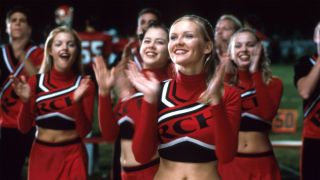
In our regular polarising-opinion series, one Total Film writer asks if cheerleading comedy Bring It On is actually an underrated gem.
Read on, and let us know if you agree with the argument put forward by having your say in the comments section below.
Is it just me? … or is Bring It On a teen classic? asks Jamie Graham
High-kicking into cinemas in 2000, cheerleader romcom Bring It On met with middling reviews (63 per cent on Rotten Tomatoes, 52 per cent on Metacritic) and vitriol (“jumbled and stupid plot, bad acting... predictable gags,” spat the San Francisco Chronicle).
Critics were in agreement with the brutish choreographer who’s brought in to up the game of the Toro squad from Rancho Carne High School: “Cheerleaders are dancers who have gone retarded,” he opines. Or maybe the mostly male, middle-aged film journos didn’t want to be seen getting excited; to argue the brains of a film with so many sports bras and bellybuttons on show is to risk being accused of intellectualising some unseemly thigh-rubbing.
But I’m convinced that Bring It On, written by Jessica Bendinger and marking the theatrical debut of Ant-Man director Peyton Reed, really is smart. It’s not so much the routine plot, as Torrance (Kirsten Dunst, herself a cheerleader at high school) is crowned captain of the all-conquering Toros and must balance dreamy boys, mean girls and school work with working up new, kick-ass routines. No, it’s the quote-worthy vernacular, the snappy satire, the sincerity mixed with self-awareness (cheerleading is presented as a highly disciplined, supremely skilled sport, but we’re still invited to snigger at Torrance saying, “My entire cheerleading career has been a lie”) and the strategic comments on class, race and sexuality.
White-skinned, blonde-haired and super-privileged, the Toros take on lower-class teams and strike up a fierce rivalry with the Clovers from East Compton High School. “That’s alright, that’s OK, you’re gonna pump our gas some day” goes one of the Toros’ chants, while Isis (Gabrielle Union), captain of the Clovers, asks, “Were the ethnic festivities to your liking?” when Torrance and new teammate Missy (Buffy’s Eliza Dushku) spy on a rehearsal.
Yes, Bring It On is PG-13 entertainment, meaning the sex, bullying and social commentary only go so far, and there’s truth in Roger Ebert’s assertion that it would have been more potent as a “hard-edged, R-rated comedy”. But it does go far enough for cultural historian Maud Lavin to have praised the film’s treatment of women, class and homophobia (the male cheerleaders are perpetually taunted by football jocks), and to suggest that Peyton’s use of bright colours and crisp edges - cinema du plastique-fantastique, if you will – is integral to the satire, not because it was shot on a Nickelodeon budget.
Bring It On is also, like, just awesome to watch, with the gravity-defying routines of the climactic cheer-off proving ballistic and balletic. Never mind that stunts more than two bodies high, flyovers and head-over- heels rotations are not actually allowed at high school level – the athleticism is astonishing, the choreography exhilarating. So while I’m not about to defend the four direct-to-DVD sequels and the stage musical, I am here to say that Bring It On should be mentioned in the same breath as Heathers, Clueless, Mean Girls, Election and John Hughes’ catalogue. It’s not cool to pooh-pooh the pom-poms. Or is it just me?
Agree or disagree with Jamie’s argument? Hit the comment section to air your view now!
